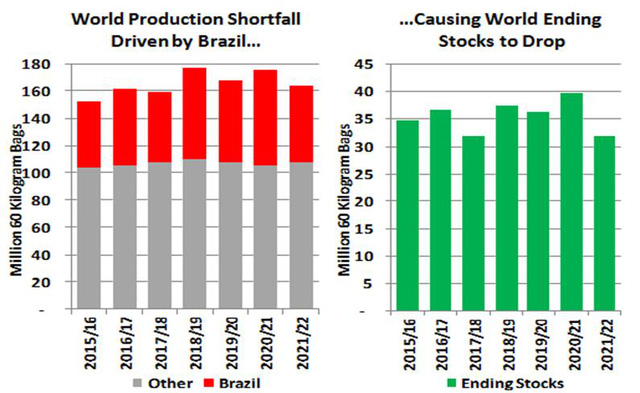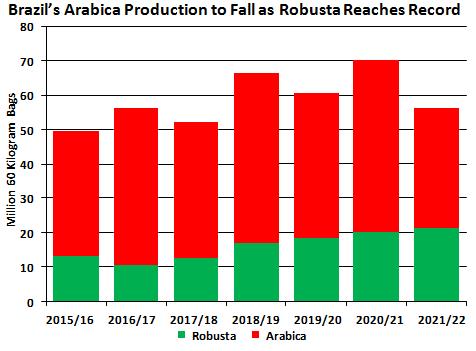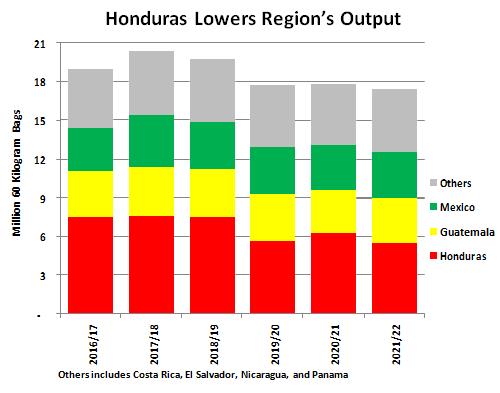World coffee production in the crop year 2021/22 is forecast to decrease by about 7%, while increased consumption demand after the blockade against Covid-19 will positively support global coffee prices in the near future.

In the latest report, the US Department of Agriculture (USDA) forecasts that world coffee production in the coffee year 2021/22 will decrease by 11 million bags from the previous year to 164.8 million, mainly due to the impact of droughts. drought and frost on the Brazilian crop as Arabica coffee enters the last year of its biennial high yielding cycle (1 bag = 60 kg).
Global coffee bean exports are expected to decline by 4.8 million bags to 115.5 million bags as Brazil's exports fall further, although Vietnam's exports are forecast to increase.
World coffee consumption is forecast to increase by 1.8 million bags to 165.0 million bags, with the largest increases in the European Union, the US and Brazil.
As production declines while consumption increases, coffee year-end stocks are expected to decrease by 7.9 million bags to 32.0 million bags.

Coffee production in Brazil and Indonesia decreased, Vietnam increased
Brazil's arabica production in MY 2021/22 is forecast to decrease by 14.7 million bags from the previous season to 35.0 million bags due to a combination of factors. Most of the production areas are in the last year of the biennial production cycle, leading to the possibility of less output in the upcoming crop.
In addition, adverse weather conditions have reduced yields, initially with drought and high temperatures in the main coffee growing regions which affected flowering as well as fruit set and development, followed by severe frosts that killed coffee trees. It is also reported that many coffee growers prune their branches at an above-average rate, thereby reducing yields. The majority of the Arabica harvest begins in May and June.
Brazil's Robusta harvest is forecast to continue to expand to reach a record 21.3 million bags, up 1.1 million bags from the previous crop. Good rainfall has supported the development of Robusta fruit in the main producing states of Espirito Santo, Rondonia and Bahia. Most of the Robusta harvest begins in April and May.
Taking into account Brazil's total coffee production (including Arabica and Robusta), crop year 2021/22 production is forecast to decrease by 13.6 million bags to 56.3 million bags. Despite the drop in production, domestic consumption is expected to continue to rise to a record 23.7 million bags. With supplies falling, coffee exports from the country are expected to drop by 9.0 million bags to 32.0 million and end-of-season stocks are forecast to fall by 2.5 million bags to 1.5 million bags.

Vietnam's coffee production in coffee year 2021/22 is forecast by USDA to recover 1.8 million bags to 30.8 million bags, following a severe drought in the previous crop year. With Robusta accounting for more than 95% of total production and Robusta prices trending higher over the past 12 months, many Vietnamese coffee growers have been motivated to increase yields by accepting more expensive crops to irrigate. coffee during the dry season, which usually lasts from January to March.
Farmers continue to intercrop coffee with fruits such as avocado and durian to increase their income. Vietnam's coffee exports are forecast to increase by 3.0 million bags to 26.0 million bags, while inventories will decrease slightly.
Colombia's Arabica coffee production in MY21/22 is forecast to decrease by 200,000 bags to 14.1 million bags due to favorable growth conditions. The National Federation of Colombian Coffee Growers (FEDECAFE) estimates that nearly 85% of coffee acreage is now grown with rust-resistant varieties, compared with just 35% in 2008/09, when unfavorable weather conditions occurred. benefits that cause rust to multiply, reducing production by one-third.
Since then, yields have increased by about 30%, largely thanks to a rehabilitation program that replaced older, lower-yielding trees with rust-resistant varieties. The program also reduced the average age of coffee trees from 15 to 6.9 years, further increasing yields. Colombian coffee exports are forecast to drop by 100,000 bags to 12.4 million bags.
Indonesia's production in 2021/22 is forecast to drop slightly by 100,000 bags to 10.6 million bags, with most of the reduction falling on Robusta. Robusta production is expected to reach close to 9.4 million bags with generally favorable growing conditions in the lowlands of South Sumatra and Java, where about 75% of the total Robusta area is grown.
Heavy rains in northern Sumatra, where about 60% of Arabica production is located, is expected to reduce yields, causing production to drop slightly to nearly 1.3 million bags. End-of-season Indonesian coffee stocks are expected to halve to just 900,000 bags as both domestic consumption and exports surge.
Coffee production in India is forecast to increase by 300,000 bags to 5.4 million bags due to increased Robusta production in Karnataka, the country's largest coffee producing State. Arabica production is forecast to decline slightly as it enters the final year of the biennial cycle. Coffee exports from India are forecast unchanged at 3.7 million bags.
Total coffee production in Central America and Mexico is forecast to decrease slightly by 400,000 bags to 17.4 million bags, of which Guatemala, Nicaragua and Mexico are expected to increase slightly, but Honduras is forecast to decrease by 700,000 bags to 5.5 million. Honduras is the leading producer in the region, accounting for about a third of production.
Ethiopia is forecast to produce 7.6 million bags of Arabica coffee in crop year 2021/22 and is the world's third largest producer of Arabica after Brazil and Colombia. The region's coffee exports are forecast to decline by 300,000 bags to 14.4 million bags mainly due to a decrease in exportable supplies in Honduras. Almost half of the region's exports go to the European Union, followed by about a third to the US market.

Both EU and US coffee imports are forecast to decrease
Coffee imports by the European Union (EU) in coffee year 2021/22 are forecast to decline by 2.5 million bags to 42.5 million and account for nearly 40% of world coffee beans imports. Top suppliers to the EU include Brazil (34%), Vietnam (24%), Honduras (8%) and Colombia (6%). Ending stocks are expected to decrease by 2.1 million bags to 14.0 million bags to maintain modest gains in consumption.
The US is the world's second largest importer of green coffee, with total volumes forecast to decline by 300,000 bags to 24.2 million bags. Top suppliers to the US include Brazil (30%), Colombia (21%), Vietnam (11%), and Nicaragua (5%). Ending stocks are forecast to decrease by 700,000 bags to 5.7 million bags.
Taking into account Brazil's total coffee production (including Arabica and Robusta), crop year 2021/22 production is forecast to decrease by 13.6 million bags to 56.3 million bags. Despite the reduced production, domestic consumption is expected to continue to rise to a record 23.7 million bags. With supplies falling, coffee exports from the country are expected to drop by 9.0 million bags to 32.0 million and end-of-season stocks are forecast to fall by 2.5 million bags to 1.5 million bags.
Address : 46th Floor, Bitexco Financial Building, No.2 Hai Trieu Street, Ben Nghe Ward, District 1, Ho Chi Minh City, Vietnam
Office : E11-01, Block E, Sunrise Riverside Building, Nguyen Huu Tho Street, Phuoc Kien Ward, Nha Be District, Ho Chi Minh City, Vietnam
Tel : +84 02873003717
Hotline : +84 0969677714 (Mobile/Whatsapp/Zalo)
Email : info@vietnamglobaltrading.com
Web : www.vietnamglobaltrading.com
Visit us as a member of Vietnam Coffee-Cocoa Association (VICOFA): http://www.vicofa.org.vn/cong-ty-tnhh-vietnam-global-trading-bid609.html

Hotline
Hotline